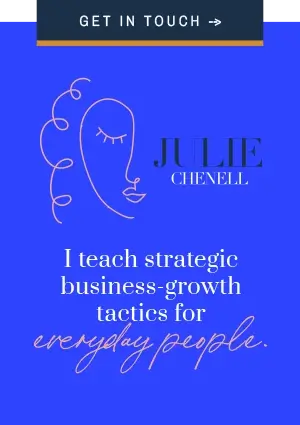
by jchenell | Jun 29, 2018 | Business Strategy, Create Your Laptop Life Podcast
Let’s talk about why so many people build courses and programs that don’t sell. It’s because people have their priorities completely backwards when they are building their offers. I’ll teach you the way I do it! Subscribe On: Full Transcript:...

by jchenell | Jun 28, 2018 | Coaching, Create Your Laptop Life Podcast
In this episode, I talk about what stops us from producing new products – imposter syndrome and our need for a 100% guarantee that we can promise a certain result. Where is the line of personal responsibility? Subscribe On: Full Transcript: Hey guys, hope...
![Episode 7: Are You Doing a Good Job? [Setting Expectations]](https://juliechenell.com/wp-content/uploads/2018/06/Episode-7-Are-You-Doing-a-Good-Job-Setting-Expectations-PIN-711x675.jpg)
by jchenell | Jun 26, 2018 | Coaching, Create Your Laptop Life Podcast
In this episode, I talk about the unbelievable importance of creating realistic expectations to make sure you stay motivated and succeed in your business. Subscribe On: Full Transcript: Hey everyone, this is Julie Hope you’re doing awesome today. I wanted to...
![Episode 7: Are You Doing a Good Job? [Setting Expectations]](https://juliechenell.com/wp-content/uploads/2023/08/Episode-7-Are-You-Doing-a-Good-Job-Setting-Expectations-PIN-711x675.jpg)
by jchenell | Jun 26, 2018 | Coaching, Create Your Laptop Life Podcast
In this episode, I talk about the unbelievable importance of creating realistic expectations to make sure you stay motivated and succeed in your business. Subscribe On: Full Transcript: Hey everyone, this is Julie Hope you’re doing awesome today. I wanted to...

by jchenell | Jun 26, 2018 | Digital Marketing, Funnel Building
Copywriting is the single most important skill you can learn if you’re looking to get into digital marketing and sales funnel creation. Time and time again I’ve seen “ugly” and poorly-designed landing pages convert because the copy is just so good. Copywriting can...



![Episode 7: Are You Doing a Good Job? [Setting Expectations]](https://juliechenell.com/wp-content/uploads/2018/06/Episode-7-Are-You-Doing-a-Good-Job-Setting-Expectations-PIN-711x675.jpg)
![Episode 7: Are You Doing a Good Job? [Setting Expectations]](https://juliechenell.com/wp-content/uploads/2023/08/Episode-7-Are-You-Doing-a-Good-Job-Setting-Expectations-PIN-711x675.jpg)






